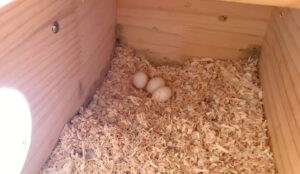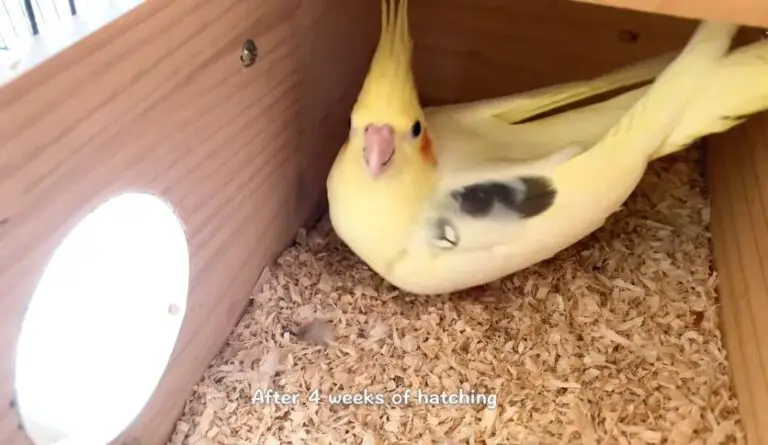Cockatiel eggs typically take about 17 to 24 days to hatch. Raising cockatiels can be a rewarding experience, but it’s important to have a basic understanding of their breeding process.
One key aspect is knowing how long it takes for their eggs to hatch. Cockatiels are known for their characteristic yellow or white eggs, which females lay in a nesting box or cage. Once the eggs are laid, the incubation period begins.
During this time, the female cockatiel diligently sits on the eggs, keeping them warm and ensuring proper development. Depending on factors such as temperature and humidity, it usually takes 17 to 24 days for the eggs to hatch. Understanding the hatching timeline helps bird enthusiasts prepare and provide appropriate care for the hatchlings.
Understanding The Basics Of Cockatiel Egg Incubation
Egg incubation plays a crucial role in cockatiel breeding. It is essential to comprehend how long it takes for cockatiel eggs to hatch. The process of incubation depends on several factors which influence the incubation time.
Importance Of Egg Incubation In Cockatiel Breeding
Proper incubation ensures the healthy development of cockatiel embryos inside the eggs. It creates an optimal environment, similar to what would occur in the wild, which enables the embryo to grow and mature correctly. Eggs require a specific temperature and humidity level to thrive. By providing the necessary conditions, bonding and nurturing between the parents and their offspring occur.
Factors That Affect Egg Incubation Time
| Factors | Description |
|---|---|
| Species | The incubation time can vary between different species of cockatiels. |
| Temperature | Warmer temperatures generally shorten the incubation period, while cooler temperatures lengthen it. |
| Fertility | Fertile eggs have a higher chance of hatching successfully compared to infertile ones. |
| Genetics | Genetic factors can impact the time it takes for eggs to hatch. |
Understanding the basics of cockatiel egg incubation assists breeders in ensuring the optimal conditions for successful hatching. By closely monitoring the factors that influence incubation time, breeders can provide the necessary care and support to maximize the chances of healthy chick development.
The Duration Of Cockatiel Egg Incubation

The average incubation time for cockatiel eggs is around 18-22 days. However, it’s important to note that this duration can vary based on various factors:
- Temperature: The consistent temperature in the incubation area is crucial in determining the incubation time. The optimal temperature range for successful hatching is 99-100 degrees Fahrenheit.
- Humidity: Adequate humidity is vital for the development of the embryo. Keep the humidity levels between 40-50% throughout incubation.
- Fertilization: Only fertilized eggs will hatch, so ensure the female has mated successfully with a male.
- Egg turning: Properly turning the eggs multiple times a day promotes even heat distribution and helps prevent the embryo from sticking to the shell.
- Genetics: Genetic factors also influence the incubation period. Some cockatiels may naturally have slightly longer or shorter incubation times.
Monitoring these factors and providing optimal conditions will increase the chances of successful hatching. Remember to handle the eggs carefully and consult a veterinarian or experienced breeder for further guidance.
Factors Affecting Cockatiel Egg Incubation Time
Factors such as temperature and humidity play a crucial role in determining the incubation period of cockatiel eggs. These environmental conditions can significantly influence the time it takes for the eggs to hatch.
The incubator’s temperature needs to be carefully regulated between 99 – 101 degrees Fahrenheit. Temperature fluctuations can adversely affect the developing embryos, leading to prolonged incubation periods or even unsuccessful hatching.
Similarly, the humidity levels in the incubator should ideally range between 40 – 60%. Adequate moisture is essential for the proper development of cockatiel eggs. Insufficient humidity can result in dryness and difficulty in hatching, while excessive humidity can lead to bacterial growth and potential disease risks.
In addition to these external factors, the behavior of the parent cockatiels can also impact the incubation period. Both male and female cockatiels take turns incubating the eggs. Their diligence and attentiveness in maintaining the ideal temperature and providing sufficient warmth can significantly affect the duration of the incubation process.
Creating An Ideal Incubation Environment
Setting up a proper nest box for cockatiel eggs is crucial for successful incubation. The nest box should be a suitable size, providing enough space for the hen to sit on the eggs and adequate protection. It is important to choose a box made of appropriate materials, such as wood, that can retain heat and provide insulation.
Maintaining optimal temperature and humidity levels is vital for developing and hatching cockatiel eggs. The ideal temperature for incubating cockatiel eggs is 99-101 degrees Fahrenheit (37-38 degrees Celsius). It is essential to monitor the temperature closely and make adjustments as needed to ensure a consistent and stable environment for the eggs.
Humidity also plays a crucial role in the incubation process. The relative humidity levels should be around 50-60% throughout the incubation period. However, during the last few days before hatching, it is recommended to increase the humidity to around 70% to assist with the successful emergence of the chicks.
Setting up a proper nest box and maintaining optimal temperature and humidity levels can significantly increase the chances of successfully hatching cockatiel eggs.
Egg Monitoring Techniques During Incubation
When it comes to monitoring cockatiel eggs during incubation, candling is a commonly used technique to observe embryonic development. This method involves using a bright light source to shine through the egg and examine its contents.
To gently candle cockatiel eggs, follow these tips:
- Find a dark environment where you can easily see the light shining through the eggs.
- Hold the egg in one hand and position a flashlight or other light source behind it.
- Place the light source near the base of the egg and observe the internal structures.
- Look for signs of development, such as veins, the presence of an embryo, and movement.
- Avoid shining the light directly into the egg for extended periods as it may heat the embryo and harm it.
- Candle the eggs periodically throughout the incubation period to monitor their progress.
By gently candling the cockatiel eggs, you can gain valuable insights into the embryonic development and ensure a successful hatching process.
Handling And Intervention During Incubation
During incubation, it is important to handle cockatiel eggs with caution to ensure their successful hatching. While intervening in the incubation process may be necessary in certain situations, one should first understand when and how to do so. Timing is crucial, as interfering too early or too late can negatively impact the eggs.
Understanding the signs of potential problems is essential before deciding to intervene. Monitoring the temperature and humidity levels regularly can help assess the overall health of the eggs. If any abnormalities are observed, intervention may be required.
However, it is important to note that handling eggs should be kept to a minimum. Excessive handling can damage the delicate embryos or disrupt the natural incubation process. When handling becomes necessary, it is advisable to wash hands thoroughly and wear clean, disposable gloves to prevent the transfer of any harmful bacteria or substances.
In conclusion, correctly understanding when and how to intervene during cockatiel egg incubation is crucial for successfully hatching healthy chicks. However, it should be done cautiously, considering the potential risks and precautions.
Recognizing Signs Of Hatching
Physical indicators that eggs are close to hatching:
Cockatiel parents show various behavioral changes when anticipating the hatching of their eggs. One key physical indicator that eggs are close to hatching is the appearance of small cracks in the eggshells. These fine cracks can be observed as the chicks begin to move inside the eggs actively. The eggs may also emit soft chirping sounds as the chicks communicate with their parents before emerging from the eggs.
Cockatiel parents exhibit heightened vigilance during this time, often sitting close to the eggs and closely guarding them. They may also frequently shift and reposition the eggs, ensuring proper incubation and warmth for the developing chicks.
By observing these physical and behavioral changes, cockatiel owners can recognize signs of hatching and ensure a suitable environment for the newborn chicks.
Post-hatching Care For Cockatiel Chicks
After the long incubation period, cockatiel eggs typically take 18-21 days to hatch. Once they do, providing the newly hatched cockatiel chicks with the proper care is crucial to ensure their well-being. Post-hatching care involves creating a safe and warm brooder environment for the chicks. A brooder is a container that provides heat to mimic the warmth they would receive from their parents. Maintaining a temperature range of 90-95°F (32-35°C) is essential during the first week to keep the chicks comfortable. Gradually reducing the temperature by 5°F each week until they are fully feathered is recommended. Additionally, it is essential to provide a soft substrate, such as paper towels or nesting materials, to ensure the chicks’ feet are protected. Feeding the newborn chicks with a commercial hand-feeding formula and regular feedings every 2-3 hours is vital for their growth and development.
Frequently Asked Questions On How Long Does It Take For Cockatiel Eggs To Hatch
How Long Should I Let My Cockatiel Sit On Her Eggs?
Allow your cockatiel to sit on her eggs for approximately 18 to 21 days. It’s important to ensure the eggs are kept warm and in a safe and comfortable environment during this time.
Can I Touch Cockatiel Eggs?
Yes, you can touch cockatiel eggs, but it’s important to be gentle and handle them with clean hands to avoid damaging them.
How Many Eggs Do Cockatiels Lay?
Cockatiels typically lay 4-7 eggs in a clutch, but the number can vary.
What To Do After Cockatiel Lays An Egg?
After a cockatiel lays an egg, provide a calm and safe environment. Ensure they have access to fresh food and water. Do not disturb the nesting area, but monitor the egg’s condition. Consulting a veterinarian is recommended to ensure the bird’s health and well-being.
Conclusion
To sum up, understanding the incubation time for cockatiel eggs is crucial for bird owners. These eggs take around 18 to 21 days to hatch on average, although slight variations may occur. During this period, providing a warm and safe environment is essential for the successful development of the eggs.
By following the appropriate measures and being patient, you can witness the miracle of new life unfold right before your eyes. Happy hatching!

Hi, I’m Regina Rios. Just another bird lover who loves to share knowledge from personal experience. I’ve grown up with pet birds since childhood as my mommy also loves birds. As I can’t pet many birds in open air in my house as my mom does; I created my first bird cage on my rooftop using wood, copper wire, and a metal shed in 2018 and start collecting pet birds. Now, I have so many pet birds such as Macaws, Parrot, Cockatiel, Parakeet, and others. Not only that, if I see natural birds are injured I keep them in my house until they get well. Now, my hobby becomes my income source as my home birds have babies and I sell them to birds lover like mine. I’ve created this blog to inspire others bird owners by sharing my personal knowledge. Good Luck!


